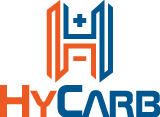
Energy company hopes to bring 220 jobs to Volusia
A company looking to solve the world’s energy problems while reducing global pollution plans to bring 220 jobs to Volusia County in the next 10 years.
Ambitious? Yes. Impossible? Not so, said Andrew Heath, president of HyCarb Inc., an early-stage energy storage company that will take up residence in Embry-Riddle’s John Mica Engineering and Aerospace Innovation Complex on Aug. 1.
Abiding by the company motto of “power with a conscience,” Heath said the company’s mission is to “find uses for carbon that are so valuable that it makes no sense to waste it out of our smokestacks and tailpipes.”
A better battery
The uses Heath speaks of are found in batteries — specifically, graphene batteries that Heath and Sigrid Cottrell, his wife and the CEO of HyCarb Inc., are working on bringing to market within the next nine to 18 months.
Graphene is a form of graphite similar to what’s found in pencils, except it’s only a single atom layer thick. Its discovery won a Noble prize in 2010, Heath said.
“Graphene is 200 times stronger than steel and six times lighter,” Heath said. “It would actually take an elephant standing on a pencil to penetrate through a layer of graphene as thin as Saran wrap.”
The company used the material to create an aero-gel that can be molded to fit into any form. One gram of the material would weigh only as much as balloon — yet it could support the surface area of roughly half an acre, Heath said.
Besides being strong, graphene is extremely light. Because of its honeycomb shape similar to the gaps or spaces found in bones, the voids between graphene’s structure walls allow more electrons to be stored, Heath said.
“We found graphene to be an excellent material for next generation batteries,” Heath said. “It turns out they are ultra-lightweight and that’s why we see aviation and the motor sports market as a great entry point for commercializing our product.”
The company plans to market its batteries first to drones and electric aircraft. The batteries currently found in drones cost $28 and up and last roughly 8 to 20 minutes, Heath said.
They’re also toxic, and pollute groundwater and soil, Cottrell said.
HyCarb’s graphene battery, in contrast, would cost 30 to 50 percent more but would charge faster, last two hours and be 90 percent recyclable. The company is working on its third prototype now, and Cottrell said it has shown “promising results.”
HyCarb is an offspring of the couple’s parent company, Solar Hydrogen Inc., a pollution reduction consulting and education firm. HyCarb’s name is a play on hydrogen and carbon, both sources of energy.
“People ask us if it’s a new diet; it’s a new diet for the planet,” Cottrell said. “The environment and helping to clean it up is what motivates us.”
Business of batteries
The company plans to utilize ERAU staff at the MicaPlex for their expertise in aviation and Federal Aviation Administration guidelines. They are the third tenant in the ERAU complex, since it opened earlier this year.
HyCarb currently has five employees, but it plans to add six to 10 more by the end of the year as it further tests its batteries. HyCarb plans to start working on batteries for other devices like cell phones after marketing its drone battery, eventually creating 220 jobs that would pay above the average salary in the area, Cottrell said.
ERAU president Barry Butler said HyCarb’s addition would be a boon for economic development in the area.
“We are excited to have the HyCarb team join our research park. In addition to their commitment to advancing innovation and attracting high-paying jobs, we are equally excited that HyCarb is a woman-owned tech business,” Butler said in a press release. “The battery technology that HyCarb is developing is bleeding edge and is relevant for industries from motorsports to aviation.”
Future developments at HyCarb could be a name-changer for the area, Heath said.
“We like the idea of knowing Ormond Beach is the home of speed,” Heath said, “and we would like to improve upon that to be the home of clean speed.
